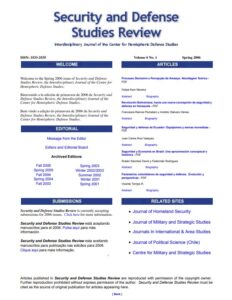Like other countries in Latin America, Venezuela received the principles of the National Security Doctrine that developed during the Cold War period. This doctrine has profound repercussions on the definition of the country's national interests and its security profile. Consequently, concepts such as territoriality, sovereignty, the internal and/or external enemy and the development of the nation have guided the policies adopted by Venezuela's military and political actors in matters of security and defense over the last fifty years. However, the presidency of Hugo Chavez Frias since 1999, has implemented the Bolivarian Revolution, which includes a re-evaluation of the traditional conception of security. It is, therefore, imperative to study and analyze the components of the new geopolitical and geo-economic vision of his political project, which includes redefining strategic objectives to respond to ongoing and new national interests, establishing new civilian-military relations, the need to create a new National Armed Forces, the goal of putting aside old doctrines that are not indigenous to the country and adopting security reforms.

